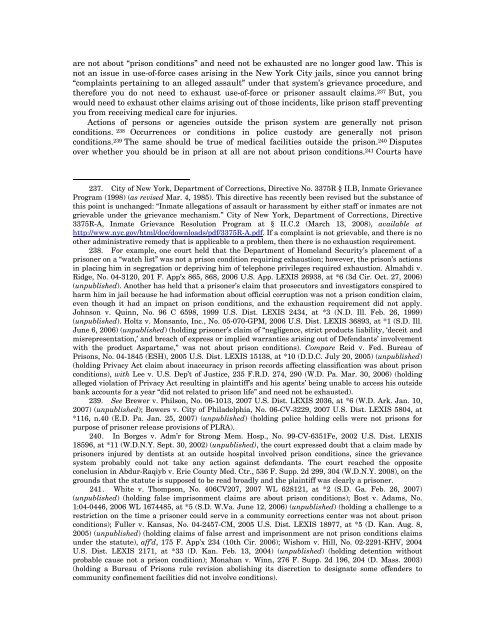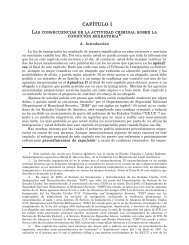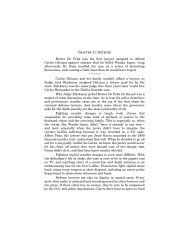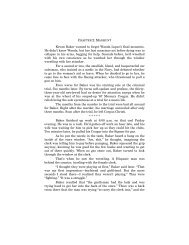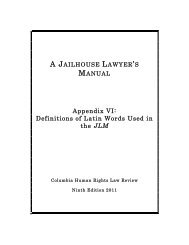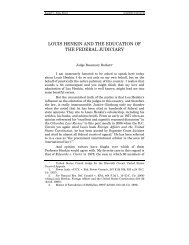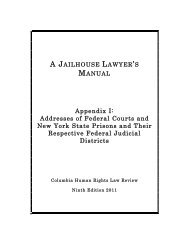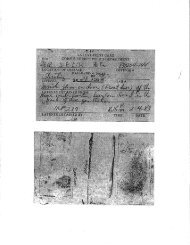A Jailhouse Lawyer's Manual Chapter 14 - Columbia Law School
A Jailhouse Lawyer's Manual Chapter 14 - Columbia Law School
A Jailhouse Lawyer's Manual Chapter 14 - Columbia Law School
Create successful ePaper yourself
Turn your PDF publications into a flip-book with our unique Google optimized e-Paper software.
are not about “prison conditions” and need not be exhausted are no longer good law. This is<br />
not an issue in use-of-force cases arising in the New York City jails, since you cannot bring<br />
“complaints pertaining to an alleged assault” under that system’s grievance procedure, and<br />
therefore you do not need to exhaust use-of-force or prisoner assault claims. 237 But, you<br />
would need to exhaust other claims arising out of those incidents, like prison staff preventing<br />
you from receiving medical care for injuries.<br />
Actions of persons or agencies outside the prison system are generally not prison<br />
conditions. 238 Occurrences or conditions in police custody are generally not prison<br />
conditions. 239 The same should be true of medical facilities outside the prison. 240 Disputes<br />
over whether you should be in prison at all are not about prison conditions. 241 Courts have<br />
237. City of New York, Department of Corrections, Directive No. 3375R § II.B, Inmate Grievance<br />
Program (1998) (as revised Mar. 4, 1985). This directive has recently been revised but the substance of<br />
this point is unchanged: “Inmate allegations of assault or harassment by either staff or inmates are not<br />
grievable under the grievance mechanism.” City of New York, Department of Corrections, Directive<br />
3375R-A, Inmate Grievance Resolution Program at § II.C.2 (March 13, 2008), available at<br />
http://www.nyc.gov/html/doc/downloads/pdf/3375R-A.pdf. If a complaint is not grievable, and there is no<br />
other administrative remedy that is applicable to a problem, then there is no exhaustion requirement.<br />
238. For example, one court held that the Department of Homeland Security’s placement of a<br />
prisoner on a “watch list” was not a prison condition requiring exhaustion; however, the prison’s actions<br />
in placing him in segregation or depriving him of telephone privileges required exhaustion. Almahdi v.<br />
Ridge, No. 04-3120, 201 F. App’x 865, 868, 2006 U.S. App. LEXIS 26938, at *6 (3d Cir. Oct. 27, 2006)<br />
(unpublished). Another has held that a prisoner’s claim that prosecutors and investigators conspired to<br />
harm him in jail because he had information about official corruption was not a prison condition claim,<br />
even though it had an impact on prison conditions, and the exhaustion requirement did not apply.<br />
Johnson v. Quinn, No. 96 C 6598, 1999 U.S. Dist. LEXIS 2434, at *3 (N.D. Ill. Feb. 26, 1999)<br />
(unpublished). Holtz v. Monsanto, Inc., No. 05-070-GPM, 2006 U.S. Dist. LEXIS 36893, at *1 (S.D. Ill.<br />
June 6, 2006) (unpublished) (holding prisoner’s claim of “negligence, strict products liability, ‘deceit and<br />
misrepresentation,’ and breach of express or implied warranties arising out of Defendants’ involvement<br />
with the product Aspartame,” was not about prison conditions). Compare Reid v. Fed. Bureau of<br />
Prisons, No. 04-1845 (ESH), 2005 U.S. Dist. LEXIS 15138, at *10 (D.D.C. July 20, 2005) (unpublished)<br />
(holding Privacy Act claim about inaccuracy in prison records affecting classification was about prison<br />
conditions), with Lee v. U.S. Dep’t of Justice, 235 F.R.D. 274, 290 (W.D. Pa. Mar. 30, 2006) (holding<br />
alleged violation of Privacy Act resulting in plaintiff’s and his agents’ being unable to access his outside<br />
bank accounts for a year “did not related to prison life” and need not be exhausted).<br />
239. See Brewer v. Philson, No. 06-1013, 2007 U.S. Dist. LEXIS 2036, at *6 (W.D. Ark. Jan. 10,<br />
2007) (unpublished); Bowers v. City of Philadelphia, No. 06-CV-3229, 2007 U.S. Dist. LEXIS 5804, at<br />
*116, n.40 (E.D. Pa. Jan. 25, 2007) (unpublished) (holding police holding cells were not prisons for<br />
purpose of prisoner release provisions of PLRA).<br />
240. In Borges v. Adm’r for Strong Mem. Hosp., No. 99-CV-6351Fe, 2002 U.S. Dist. LEXIS<br />
18596, at *11 (W.D.N.Y. Sept. 30, 2002) (unpublished), the court expressed doubt that a claim made by<br />
prisoners injured by dentists at an outside hospital involved prison conditions, since the grievance<br />
system probably could not take any action against defendants. The court reached the opposite<br />
conclusion in Abdur-Raqiyb v. Erie County Med. Ctr., 536 F. Supp. 2d 299, 304 (W.D.N.Y. 2008), on the<br />
grounds that the statute is supposed to be read broadly and the plaintiff was clearly a prisoner.<br />
241. White v. Thompson, No. 406CV207, 2007 WL 628121, at *2 (S.D. Ga. Feb. 26, 2007)<br />
(unpublished) (holding false imprisonment claims are about prison conditions); Bost v. Adams, No.<br />
1:04-0446, 2006 WL 1674485, at *5 (S.D. W.Va. June 12, 2006) (unpublished) (holding a challenge to a<br />
restriction on the time a prisoner could serve in a community corrections center was not about prison<br />
conditions); Fuller v. Kansas, No. 04-2457-CM, 2005 U.S. Dist. LEXIS 18977, at *5 (D. Kan. Aug. 8,<br />
2005) (unpublished) (holding claims of false arrest and imprisonment are not prison conditions claims<br />
under the statute), aff’d, 175 F. App’x 234 (10th Cir. 2006); Wishom v. Hill, No. 02-2291-KHV, 2004<br />
U.S. Dist. LEXIS 2171, at *33 (D. Kan. Feb. 13, 2004) (unpublished) (holding detention without<br />
probable cause not a prison condition); Monahan v. Winn, 276 F. Supp. 2d 196, 204 (D. Mass. 2003)<br />
(holding a Bureau of Prisons rule revision abolishing its discretion to designate some offenders to<br />
community confinement facilities did not involve conditions).


